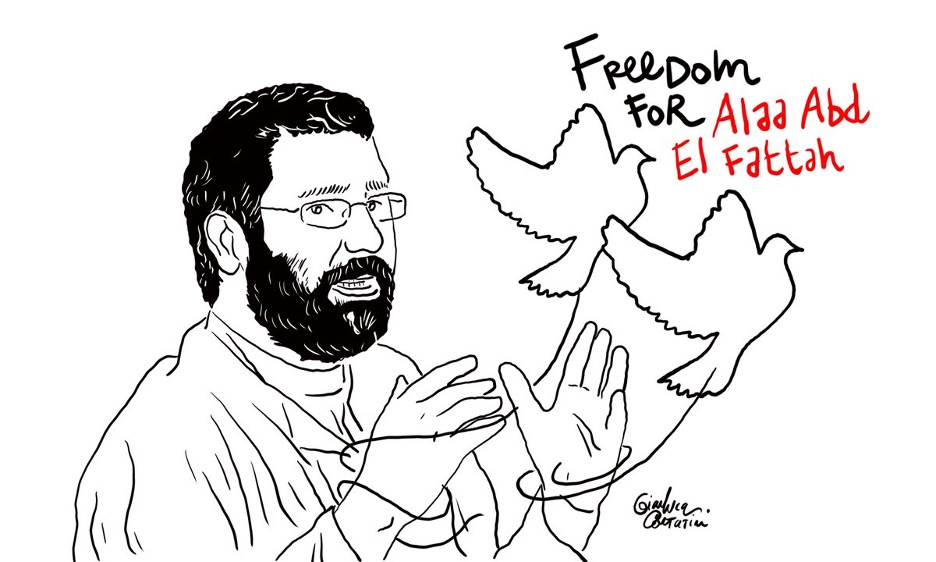Ahead of the United Nations Climate Change Conference (COP27)—which began in Sharm el-Sheikh, Egypt, on Sunday, November 6—CPJ joined more than 60 civil society organizations in a letter calling Egyptian authorities to immediately release British-Egyptian blogger and activist Alaa Abdelfattah, who announced an escalation of his hunger strike in prison, “and all those arrested and detained solely for exercising their rights.”
Abdelfattah, imprisoned since 2019, began a hunger strike in April of no more than 100 calories per day, which resulted in the severe deterioration of his health. In a November 1 letter to his family, Abdelfattah announced that he will go on a full hunger strike, and on November 6, coinciding with the beginning of COP27, he will stop drinking water.
Watch remarks by Sherif Mansour, CPJ’s Middle East and North Africa program coordinator, at a protest in solidarity with Abdelfattah in Washington, D.C., and CPJ’s interview with Abdelfattah’s sister, Sanaa Seif. CPJ’s Middle East and North Africa program has been monitoring the blogger’s hunger strike.
Since September, Egyptian authorities have detained at least three journalists—Mohamed Mostafa Moussa, Amr Shnin, and Mahmoud Saad Diab. “By arresting three journalists ahead of (COP27), President Abdel Fattah el-Sisi’s government is making a clear statement that it does not care for the protection of journalists or human rights,” Mansour said.
- CPJ asks British authorities to strengthen protection for London-based Iran International staff
- Staff of Serbian newspaper Danas gets email threatening Charlie Hebdo attack
- Turkish president asked Sweden to deport exiled journalist Bülent Keneş
- Senegalese journalist Pape Alé Niang detained after reporting on politician’s rape charges
- DRC soldiers attack journalist David Ramazani, police detain Janvier Bamunoba
- Congolese journalists face death threats as M23 rebels advance, flee for safety
- Burundian journalist Floriane Irangabiye detained for over two months without formal charge
- French journalist Sonia Rolley expelled from DRC, denied accreditation
- CPJ alarmed by wiretapping charges against Ohio newspaper editor
- Tajik journalist Zavqibek Saidamini sentenced to 7 years in prison
- Kyrgyzstan freezes Radio Azattyk bank account under money laundering laws
- Ukrainian law enforcement beat, damage equipment of journalists covering protest
- Four Greek investigative journalists say intelligence authorities followed them, tracked their phones
Spotlight
Ahead of the 2022 FIFA World Cup in Qatar, CPJ wrote a safety advisory with information to help journalists and media workers prepare for the event that will take place from November 20 to December 18.
The safety advisory includes information about digital and physical safety, such as dealing with detention, accreditation, violence, and laws about dress and sexual identity.
Journalists working in the small nation bordering Saudi Arabia have faced digital security threats, legal issues, and challenges associated with cultural sensitivities. The Qatari government has low tolerance for critical reporting on domestic issues, and journalists covering human rights have been detained.
- The Guardian view on Egypt’s abuses: justice needed for Alaa Abd el-Fattah – and the others — Editorial, The Guardian
- Weary of crackdown, Iran’s regime takes on citizen journalists — Somayeh Malekian, ABC News
- For Iranian journalists in Turkey, threats rise along with tensions back home — Şenol Balı, Turkey recap
- The Chilling: A global study of online violence against women journalists — Julie Posetti and Nabeelah Shabbir, International Center for Journalists
- Global wheels of justice turn slowly for slain journalists — Naledi Sikhakhane, Daily Maverick
- UN Human Rights Chief Türk issues open letter to Twitter’s Elon Musk — United Nations Office of the High Commissioner for Human Rights
